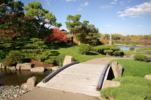As Trump heads to the G7, Canada hopes to avoid another Charlevoix-style eruption
By Canadian Press on June 14, 2025.
OTTAWA — U.S. President Donald Trump is set to arrive Sunday in Alberta for the G7 summit — his first visit to Canada since leaving in a huff seven years ago.
Ottawa could use everything from golfing and creative scheduling to special cabinet orders to make the visit successful and avoid a repeat diplomatic disaster.
“He is somebody who is very prickly when he feels like he’s not being fully respected,” said Eric Miller, president of Rideau Potomac Strategy Group, a cross-border consultancy.
“You want to make absolutely sure that … he walks away and says, ‘You know, those Canadians aren’t so bad after all.'”
Better than last time
The last time Trump was in Canada — for the G7 summit in the Charlevoix region of Quebec — things ended in a blowout.
Trump refused to sign the communiqué, the published list of statements on common G7 issues that are mostly negotiated and agreed to by member nations ahead of time. He left early and lambasted Trudeau as “very dishonest and weak” in a spat over tariffs.
The summit included what Miller called the “photograph for the ages” — of then German chancellor Angela Merkel and others standing sternly over a seated Donald Trump, who appeared to be glaring back with crossed arms.
German Ambassador to Canada Matthias Lüttenberg put it bluntly when he told a June 4 panel that Ottawa was again navigating “very difficult circumstances” as G7 chair — and capably, in his view.
“I mean, I wouldn’t like to negotiate with a country at the table who’s questioning my sovereignty as a state,” he said.
Sen. Peter Boehm, who was summit head in 2018, recalled two late nights of negotiations because the Trump administration didn’t align with the others on including climate change or references to the “rules-based international order.”
Informal talks
Prime Minister Mark Carney won office in April after repeatedly saying he could stand up to Trump’s threats to ruin the Canadian economy in order to make the country an American state.
Carney had a cordial visit to Washington in early May and even got praise from Trump on social media and in person, despite the president insisting Canada should still become a U.S. state.
The two have continued talking. U.S. Ambassador Pete Hoekstra revealed earlier this month that the president and Carney have exchanged frequent calls and texts on trade and tariffs.
Miller said facetime between the two leaders in Alberta could help them make progress on economic concerns, as well as Trump’s pitch to bring Canada into his proposed Golden Dome missile shield project.
“Given that there is this conversation underway, it is important that they have an opportunity to continue that, and to meet perhaps in a setting that is less structured and formal than the Oval Office,” Miller said.
“Life is about imperfect choices, and it’s absolutely the right thing to have Mr. Trump come to Canada.”
He said he’s not sure if there will be any formal announcement, though he added Trump is keen to sign agreements with multiple countries ahead of his self-imposed July 9 deadline for so-called retaliatory tariffs.
Miller said both Canada and the U.S. are likely to take credit for Ottawa announcing this month it will drastically speed up its pledge to meet NATO’s defence spending target.
Trump might also take note of the fact that he’s in one of the few provinces that have opted to resume sales of U.S. alcohol, after all provinces banned it from their liquor store shelves in response to U.S. tariffs.
Lower expectations
Ottawa’s decision to schedule relatively short group discussions among G7 leaders, and to invite numerous other world leaders, could mean more of the one-on-one meetings that Trump prefers.
“Trump does not like multilateral meetings particularly. He loses interest,” Boehm said.
Canadian officials have said they are focused on releasing shorter, focused statements — which could avoid the kind of major blowups that could come from trying to craft the kind of massive joint communiqué that has concluded almost all other G7 summits.
Former prime minister Jean Chretien told a panel Thursday that if Trump does have an outburst, G7 leaders should ignore him and “keep talking normally.”
Miller said that for Canada, “ensuring a positive agenda that doesn’t lead to acrimony afterwards” means advancing its interests without isolating the U.S., particularly with so many guest leaders attending.
“The trick that Mr. Carney has to pull off is to reassure the U.S. that it wants a good, positive relationship — while at the same time running vigorously, as quickly as possible, to try to build new relationships,” he said.
It’s also entirely possible that Trump will leave before the meetings conclude.
A visiting felon
Keeping it positive is also likely why Ottawa will skirt rules that might bar Trump from crossing into Canada after he was found guilty on 34 criminal counts in a “hush money” trial in May 2024.
Immigration lawyers say those convicted of serious crimes abroad must serve their time and wait five years before seeking a certificate of admissibility to Canada, though there are loopholes if someone seeks a visa for a compelling reason.
The federal cabinet passed a formal order published in February that gives diplomatic immunity and privileges to “representatives of a foreign state that participate in the G7 meetings.”
Fore!
Another way Canada could ensure a successful visit could be to get Trump to the Kananaskis Country Golf Course — a prospect much discussed in media reports that remained unconfirmed as of Friday afternoon.
Carney gave Trump a hat and golf gear from that course during his visit to the Oval Office in May.
Miller said that wasn’t just a gimmick — Trump loves making deals while teeing off, and it could provide Carney or others with hours of facetime on a golf cart, which is Trump’s comfort zone.
“Golf has been pretty central to his life,” he said. “It makes eminent sense to have Mr. Trump playing at a high-quality golf course.”
This report by The Canadian Press was first published June 14, 2025.
Dylan Robertson, The Canadian Press
43
-42





